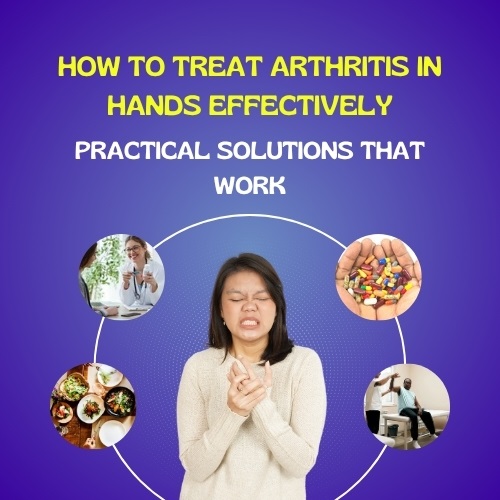Arthritis in the hands can limit even the most basic tasks—from turning a doorknob to typing on a keyboard. If you feel persistent stiffness, swelling, or pain in your fingers or wrists, you may be dealing with one of the most common types of arthritis: osteoarthritis or rheumatoid arthritis. Practical advice on arthritis in hands treatment, including medication, home care, and long-term management options.
What Causes Arthritis in Hands?
Arthritis in the hands usually develops from wear and tear (osteoarthritis) or autoimmune disorders (rheumatoid arthritis). In osteoarthritis, cartilage—the smooth tissue covering the ends of bones—breaks down over time, causing pain, stiffness, and joint damage. Rheumatoid arthritis, on the other hand, results from the immune system attacking the joint lining.
Key causes include:
- Repetitive hand movements
- Age-related joint degeneration
- Previous hand injuries
- Genetics
- Autoimmune conditions
Related Article: Arthritis in Hands: Early Symptoms You Shouldn’t Ignore
Early Signs You Shouldn’t Ignore
The earlier you identify symptoms, the sooner you can begin effective arthritis treatment hands strategies. Common signs include:
- Pain in the fingers, thumb base, or wrist
- Swelling and warmth in joints
- Morning stiffness that lasts over 30 minutes
- Weakened grip strength
- Visible joint deformities over time
These symptoms tend to worsen without treatment, so early management is essential.

Related Article: How Rheumatoid Arthritis Affects the Hands and What You Can Do About It
Medical Treatments That Can Help
A doctor will typically confirm the diagnosis through physical examination, blood tests, and imaging (X-rays or ultrasound). Once diagnosed, your treatment plan may include:
1. Anti-Inflammatory Medications
Nonsteroidal anti-inflammatory drugs (NSAIDs) such as ibuprofen or naproxen help reduce swelling and discomfort. For stronger cases, doctors may prescribe corticosteroids either orally or through injections.
2. Disease-Modifying Antirheumatic Drugs (DMARDs)
These are especially useful for rheumatoid arthritis. Methotrexate and sulfasalazine slow disease progression and preserve joint function.
Related Article: How to Relieve Arthritis Pain in Hands Naturally and Effectively
3. Topical Treatments
Creams containing capsaicin or diclofenac can be applied directly to sore joints for localised relief without systemic side effects.
4. Biologic Injections
For patients with severe inflammation that doesn’t respond to traditional treatment, biologic drugs (such as etanercept or adalimumab) target specific immune responses.
Daily Habits That Make a Difference
Medication plays a role, but long-term arthritis hands treatment also relies on your daily routine. Making simple changes can reduce flare-ups and keep your hands functioning better.
Related Article: Best Joint Supplements of 2025, West Virginia – Herbal Care Products
Apply Heat and Cold
- Heat: Warm compresses and paraffin wax treatments soothe stiff joints.
- Cold: Ice packs reduce swelling and numb sharp pain after activity.
Hand Exercises
Keeping your hands mobile can prevent further joint stiffening. Try:
- Finger bends: Bend each finger toward the palm, hold, and release.
- Thumb stretch: Move your thumb away from your fingers, then back.
- Fist making: Slowly form a gentle fist and then stretch your fingers wide.
Repeat these several times daily for improved mobility.
Use Supportive Devices
- Compression gloves help reduce swelling overnight.
- Splints offer stability and reduce movement-related pain during activities.
- Ergonomic tools reduce strain in the kitchen, office, and garden.
Diet and Lifestyle Support
What you eat also affects your inflammation levels and hand health. Focus on foods that ease joint stress:
Related Article: Arthritis Sufferers Swear by These 7 Supplements—Find Out Why
Anti-Inflammatory Foods
- Oily fish (salmon, sardines)
- Leafy greens (spinach, kale)
- Nuts (almonds, walnuts)
- Olive oil
- Berries and cherries
Foods to Avoid
- Sugary snacks and beverages
- Refined carbs (white bread, pasta)
- Processed meats
- Fried foods
Maintaining a healthy weight reduces overall joint stress and slows arthritis progression.
Supplements That May Help
Several Natural Joint Supplement for Arthritis Joint Relief show potential benefits for arthritis treatment hands:
- Glucosamine and Chondroitin: Support cartilage repair and reduce pain in osteoarthritis.
- Turmeric (Curcumin): A natural anti-inflammatory compound.
- Omega-3 Fatty Acids: Help reduce joint stiffness and morning pain.
- Vitamin D: Supports immune function and bone strength.
Always consult your doctor before starting any supplement, especially if you’re already on medication.
Related Article: Arthritis Relief Supplement: Soothe Aching Joints Naturally
Physical Therapy and Professional Help
Working with a physiotherapist or occupational therapist can significantly improve hand function. Therapy sessions often include:
- Gentle stretching
- Strength-building routines
- Joint protection techniques
- Adaptive device training
Your therapist may recommend specific tools or suggest better ways to do everyday activities without straining your joints.
Considering Surgery
In cases where severe arthritis has destroyed joint structure, surgery may be the best option. Procedures include:
- Joint fusion (arthrodesis): Bones are fused together for stability, sacrificing movement.
- Joint replacement (arthroplasty): The damaged joint is replaced with an artificial one.
- Synovectomy: Removes inflamed joint lining, particularly in rheumatoid arthritis.
Surgical intervention is typically the last step, only after all non-surgical options have failed.
Related Article: Cure Your Arthritis Naturally: 10 Proven Remedies That Work
Coping Emotionally
Chronic pain in your hands can be frustrating, especially if it affects work, hobbies, or daily tasks. Finding ways to manage your mental wellbeing is essential:
- Talk to someone: A therapist or support group can help with emotional stress.
- Stay active: Low-impact exercise like walking or swimming supports overall health.
- Prioritise rest: Give your hands time to recover during flare-ups.
Managing arthritis isn’t just about treating physical symptoms—it also involves protecting your emotional resilience.
Related Article: Joint Support: Natural Joint Supplement for Arthritis Joint Relief Review
Realistic Expectations and Long-Term Goals
There’s no single cure, but a combination of lifestyle changes, medical treatments, and therapies can significantly reduce pain and keep your hands functional. If you’re exploring how to treat arthritis in hands, you’re not alone—and consistent management will improve your comfort and confidence.
Final Thoughts
Taking care of your hands is a daily commitment. Whether you’re using medication, hand therapy, or nutritional support, every step counts. If you want more detail on arthritis in hands treatment, click through to explore related insights and recommendations.




